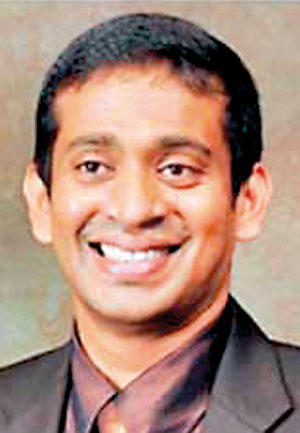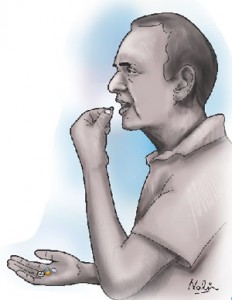News
Sexual performance enhancing drugs are no ‘magic’ bullet for happiness

Sexual Medicine Specialist Dr. Lasantha Malavige
It is easy and exciting but very dangerous. Many just drop by a pharmacy, pick up that drug which is supposed to enhance performance or extend the thrill, over-the-counter and not give it a second thought.
“Beware,” is the gentle warning from Sexual Medicine Specialist Dr. Lasantha Malavige, who reiterates that there is nothing wrong with sexual performance enhancing drugs but the problem lies with misusing or abusing them, sans guidance from a doctor.
These drugs should not be popped at a person’s whim and fancy. They are prescription drugs. People should not buy them over the counter and pharmacies should not sell them without a prescription from a qualified doctor, he points out.
Dr. Malavige is not issuing this warning without valid evidence. Pointing out that whenever a pharmacy is asked what drug sells the most, the answer without hesitation is sexual performance enhancing drugs, 99% of which are bought by people over-the-counter.
He explains that when such drugs are taken for sexual problems such as erectile dysfunction (ED), without consulting a doctor, other more life-threatening diseases are missed. What most people do not realise is that there is evidence of a link between ED and heart disease. ED could be a red light that the person is at risk of developing cardiovascular disease, as ED precedes cardiovascular disease by about five years, as both are due to atherosclerosis (plaque or fatty deposit build-up) in the blood vessels. Therefore, ED should be taken as a potential symptom and that person’s heart health screened. Cardiovascular disease is the No. 1 killer not just across the world but in Sri Lanka as well.
“Remember, there is an inextricable link between sex and the heart,” says Dr. Malavige. The penile artery is 1 to 2mm while the coronary artery is 3 to 4mm and atherosclerosis would first show up in the penile artery by creating a block. When these symptoms arise, they have to be taken seriously, the underlying causes need to be checked out and treated. In such situations, if sexual performance enhancing drugs are taken without getting oneself checked by a doctor for the causes of ED, it is “a missed opportunity” to treat cardiovascular disease.
If, meanwhile, the performance issues are related to psychosocial or relationship problems, these drugs will not have any impact, he says, adding that then what is needed is psychosocial counselling and relationship guidance to resolve matters.
Moving to a different track, he talks of deaths during sex, with many blaming them on sexual performance enhancing drugs. What most people are oblivious to is that the person who dies during such intimacy may have had a serious heart condition and was not fit to engage in sexual activity.

Referring to numerous advertisements in newspapers promoting so-called sexual performance enhancing drugs, Dr. Malavige discloses that what is being touted are supplements and herbal medications, with false promises. “These are claims which are not evidence-based. Their effectiveness needs to be proved through clinical research and trials.”
Looking at younger people, Dr. Malavige points out that when they take sexual performance enhancing drugs unnecessarily their mindset changes, lulling them into a false belief that they need to use these drugs without which they cannot perform. They have no confidence in themselves. Teenagers and young men in their 20s and 30s buy these drugs over the counter, assuming that they are ‘delay tablets’. This is abuse of these drugs, for there is absolutely no delaying effect wrought by these medications. The end result may be very serious side-effects for the user.
His advice to all who may be tempted to try out these medications is: “Sexual performance enhancing drugs are not magic bullets for happiness. Intimacy and closeness are the important factors, even if sexual activity in itself may be limited.”

| Sex and the heart A major concern that many people, both men and their partners, have is that someone with heart disease is not fit to engage in sexual activity. “Heart disease is not a ‘contraindication’ for sexual activity. The need is proper assessment,” says Dr. Lasantha Malavige, allaying common fears that sexual activity could precipitate a heart attack. If the person is anxious when engaging in sexual relations, the chances of suffering a heart attack increase. When there is unhappiness, depression could set in which, in turn, is a risk factor for a heart attack. It’s a vicious circle. He gives out a few simple guidelines. Citing the example of a person who exercises regularly, he points out that if he can tolerate “moderate” exercise, then he is fit to have sexual relations. “Moderate,” he details as either walking one mile in 20 minutes or climbing up and down two flights of stairs briskly without cardiac symptoms. If, however, cardiac symptoms such as chest pain (angina), palpitations and breathlessness are experienced, then it would be a clear “No, no” for sex until assessed by a doctor. If a person is not exercising and uncertain about the status of his heart, he should get himself checked by a cardiologist and undergo an exercise ECG (electrocardiogram). If he can go up to Stage 2 of the four stages, he should be able to engage in sex without fear. “Generally fit for sex,” would be the diagnosis, it is learnt. According to Dr. Malavige major studies in Germany and also Japan have found that those with heart issues would not go into crisis if they have sexual relations with their ‘established’ partners. Most cardiac deaths occur when sexual activity is with an extramarital partner as in these situations the victim is very likely to be under the influence of liquor, after a heavy meal, in an unknown or unfamiliar setting, with an unknown or less known partner who would probably be younger. This causes undue excitement, needing greater cardiac (heart) effort. “The continuation of sexual activity with an ‘established’ partner, meanwhile, is beneficial to the health. Therefore, it is important to sort out whatever cardiac, medical or sexual problems a person has and continue to engage in sexual activity,” he adds. |

